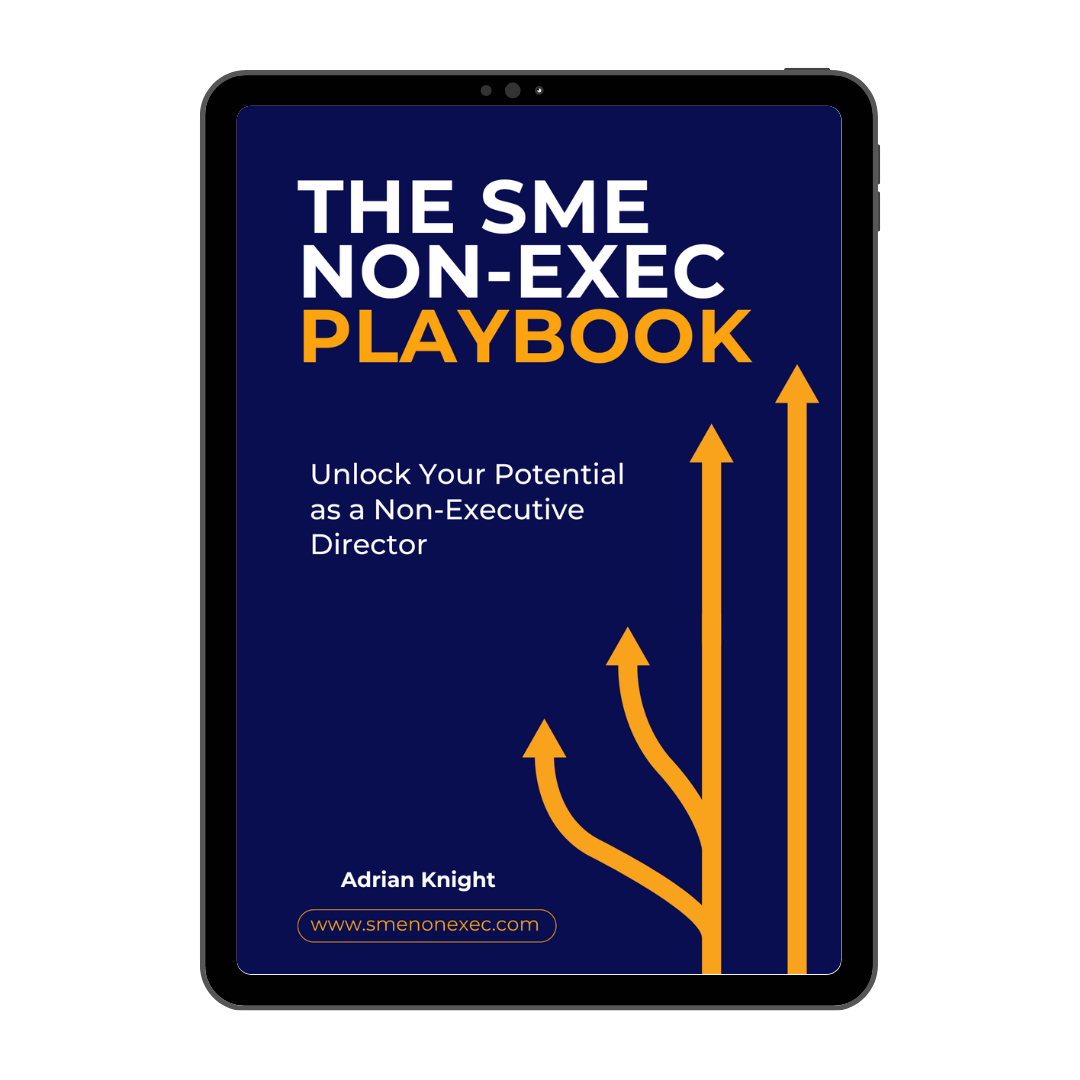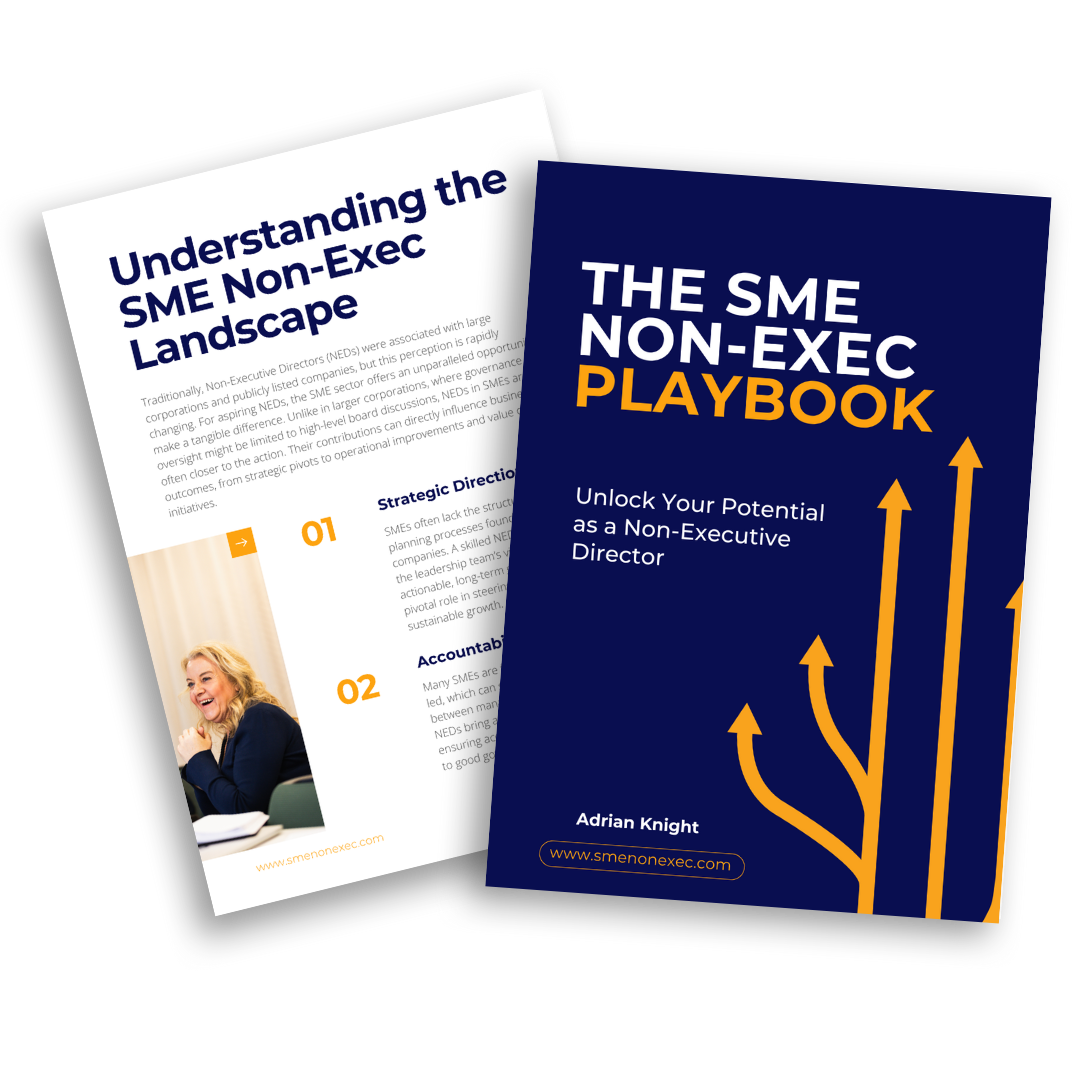The First 90 Days: Your Blueprint for NED Success

First impressions matter. What you do when you first enter a business as a Non-Executive Director matters more than at any other point in your appointment working with an SME.
Why the First 90 Days Define Your NED Success
The first 90 days is undoubtedly the most critical period for both the Non-Exec and the SME. In many ways, this period will define the success or failure of your working relationship together.
That's why it's surprising when SME owners share stories of experienced executives stepping into their first NED role without a clear plan for those crucial early days. While there's value in "learning through doing," there must be a plan and understanding of how to work before the engagement begins.
A "figure it out as you go" approach is not advisable, especially when the foundation of successful NED engagements is built in those initial three months.
Let's explore four critical insights to help you navigate those crucial first 90 days with confidence and set yourself up for long-term Non-Executive Director success.
Insight 1: Trust Comes Before Influence (And Must Be Earned Deliberately)
Executive experience and expertise do not automatically equal influence in the boardroom. This reality applies in corporate environments as well as within SMEs.
Influence working with an SME is built on a foundation of trust—and trust must be earned deliberately. SME founders may respect your experience, but that doesn't mean they'll immediately act on your advice or open up about their deepest business challenges.
There's often a trust-building phase where the business owner holds back, assessing whether you truly understand their world and have their best interests at heart. I often describe this as crossing a "mental threshold"—the moment when the scales of trust tip in the NED's favor.
Instead of diving straight into strategic recommendations in your first board meeting, focus on active listening, asking insightful questions, and finding opportunities to demonstrate that you understand the business owner's vision and challenges.
Build trust before wielding influence in your NED appointment.
Insight 2: Quick Wins Create Credibility (And Open Doors to Bigger Impact)
Starting with strategic recommendations often backfires. As an accomplished executive, you'll quickly spot opportunities for significant strategic shifts or transformations in the business. But without established credibility, your recommendations—no matter how brilliant—will likely face resistance.
One SME founder shared: "Our new NED immediately suggested we overhaul our entire sales process. She was probably right, but we weren't ready to hear it from someone who hadn't yet proven they understood our business."
Another NED, a former operations executive, admitted he nearly lost a promising SME board position because he couldn't shift from "telling mode" to "asking mode" quickly enough.
SME owners look for evidence that you understand them before they trust your judgment on bigger issues. Instead of tackling big, complex challenges first, identify and deliver two to three quick, visible wins that demonstrate your value without requiring massive change.
One manufacturing Non-Executive Director helped his new board secure a 5% discount from a key supplier in his first month—a small win that saved the company £30,000 annually and immediately established his credibility.
Demonstrate impact before driving transformation in your NED role.
Insight 3: You're Being Evaluated on More Than Your Expertise
In executive roles, your technical expertise and functional knowledge are primary indicators of your value. In NED roles, especially with SMEs, you're being evaluated on a broader set of criteria that often go unspoken.
A close friend with a portfolio of SME NED appointments revealed: "In the first 90 days, I'm highly focused on how I interact with the team, understanding the company's history, evaluating how they handle disagreement, and taking a genuine interest in the business model."
SME owners are asking themselves questions like:
- Will this person respect what we've built or just criticize everything?
- Can they adjust their guidance to our scale and resources?
- Do they listen as much as they talk?
- Do they understand our culture and values?
Rather than focusing solely on demonstrating your expertise, pay attention to building relationships with each stakeholder, understanding the company's history and culture, and showing genuine curiosity about how things work.
Connect as a person, not just as an expert in your Non-Executive Director capacity.
Insight 4: Establishing the Right Rhythms and Boundaries Determines Long-Term Success
The patterns you establish in the first 90 days shape your entire tenure. Many NEDs fail to establish clear working cadences and boundaries in their first three months, leading to either under-engagement or involvement that becomes unsustainably time-intensive.
One former finance director shared: "I never clearly established how I'd work with the CEO between board meetings. Six months in, I was fielding daily calls and emails that consumed far more time than I'd allocated to the role."
Working with SMEs is a relatively untapped and fertile area for Non-Executive Directors. However, there's also a level of education and sophistication that's currently lacking. SME owners often don't know how to utilize a NED effectively—they need guidance on when and how to engage you.
Instead of letting these patterns develop without focus, proactively establish:
- How and when you'll communicate between board meetings
- Which decisions require your input versus what can proceed without you
- Your preferred information flow and reporting format
- Clear expectations around your availability and response times
One technology NED uses her first meeting with a new CEO to outline: "Here's how I can be most valuable to you and here's how we can work together effectively."
Structure creates sustainability in your NED engagement.
Building the Foundation for Long-Term NED Success
The first 90 days of any NED appointment aren't just about learning the business. This period is about establishing the foundation for a productive, impactful relationship.
As someone who has appointed NEDs to SME boards and helped executives transition out of corporate into portfolio careers for over a decade, I can confirm that the patterns, relationships, and expectations set in these early days are extraordinarily difficult to change later.
Those who navigate these initial months strategically find themselves in positions of genuine influence, able to make meaningful contributions. Those who miss these early opportunities often struggle to gain traction months or even years into their appointment.
There's nothing inherently wrong with diving in quickly to build experience on-the-go or making recommendations early on. I'm simply cautioning against entering this crucial period without a clear plan for how you'll establish trust, demonstrate value, and set up sustainable working patterns.
Many of the most successful Non-Executive Directors are deliberate and measured in their approach during their first board meetings and in their first 90 days.
Your First 90 Days Success Plan
What did your first 90 days look like in your NED role? Was there evidence of the dynamics outlined above? Or perhaps you've learned some hard lessons about what not to do?
If you're preparing for your first NED appointment, having a clear 90-day success plan can make the difference between struggling to gain traction and establishing yourself as a valuable board member from day one.



